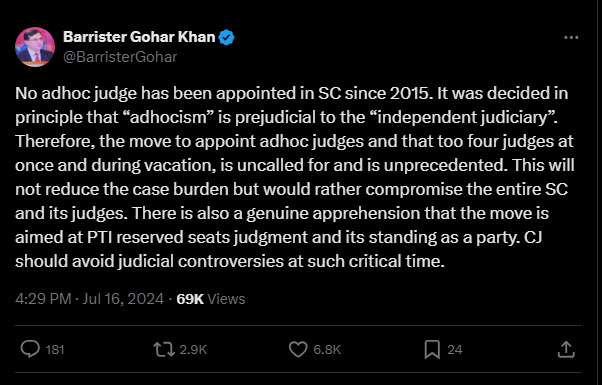Ad hoc judges’ appointment ‘aimed at reserved seats judgment’: PTI chairman

- Barrister Gohar says proposal is “uncalled for”.
- No ad hoc judge appointed in SC since 2015, says PTI chairman.
- Says “genuine apprehension” move targets reserved seats ruling.
Reacting to the proposal of appointing ad hoc judges at the apex court, Pakistan Tehreek-e-Insaf (PTI) Chairman Barrister Gohar Ali Khan on Tuesday said “there is a genuine apprehension the move is aimed at PTI’s reserved seats judgment and its standing as a party”.
“The move to appoint ad-hoc judges and that too four judges at once and during vacation, is uncalled-for and is unprecedented,” PTI Chairman Barrister Gohar Ali Khan stated expressing suspicion about the proposal, in a post on X (formerly Twitter).
The Imran Khan-founded party raised alarm after CJP Qazi Faez Isa nominated four judges —Justice (retd) Mushir Alam, Justice (retd) Maqbool Baqir, Justice (retd) Mazhar Alam Miankhel, and Justice (retd) Sardar Tariq Masood— as ad hoc judges in the Supreme Court.
According to sources, the JCP stated that it would consider the proposal to reduce the number of pending cases in the country’s top court.

The apex court, in its July 12 short order, ruled that the PTI is allowed to have seats reserved for women and minorities in all legislatures including the National Assembly.
The PTI chairman argued that not a single ad hoc judge had been appointed in the apex court since 2015. “It was decided in principle that ‘adhocism’ is prejudicial to the ‘independent judiciary,” Gohar said.
Dissenting from the argument regarding easing the SC’s workload, the PTI leader said that the appointment of four ad hoc judges would not reduce the case burden. Instead, he stressed that these appointments would compromise the entire Supreme Court and its judges.
It should be mentioned here that the JCP will meet on July 19 at 3pm in the top court’s conference room. The official note for the meeting says that despite best efforts, the cases in the top court continue to accumulate.
“In view of the huge number of pending cases and the ever-increasing trend of the institution of cases in the SC, an effective way to ensure that more cases are decided than instituted and to reduce, and hopefully eliminate the cases, which are pending adjudication for several years, it would be appropriate to appoint experienced judges as ad hoc judges of the SC,” said the notification.
Pendency of cases surges by 3.9% to 2.6m
The Law and Justice Commission of Pakistan (LJCP), in its bi-annual report of judicial statistics, said the number of pending cases in the courts surged to 2.26 million during the second half of the year 2023, increasing the overall pendency by 3.9%.
The report revealed that 82% of the pending cases (1.86 million) were at the district judiciary level and the remaining 18% (0.39 million cases) were at the upper tier, including the SC, Federal Shariat Court, and high courts.
As per the report, 2.38 million new cases were filed during the period, while the courts managed to decide 2.30 million cases.
Despite a significant settlement of cases, the pending cases increased due to the continual filing of new ones, the statement said.
“Civil cases constitute 81% of the cases pending in the high courts, while criminal cases account for 19%,” the report added.





